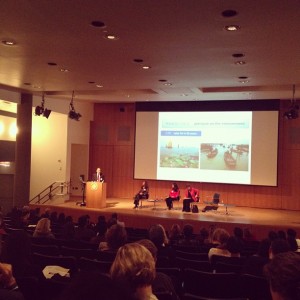This evening I went to an event discussing human rights and the environment in China.* The big draw was Ma Jun, one of the most recognized names in Chinese environmental protection and the director of the Institute for Public & Environmental Affairs (IPE / 公众环境研究中心).

Ma is a key figure in the movement for environmental protection, protection of humans from contaminated materials, and open information as a means to an end. He argues for a pragmatic mode of working in China that prioritizes outcomes over ideal processes.
That is to say, the democracy-oriented idealists in the crowd were at times unhappy with the approach that Ma describes as using “leverage” from areas where NGOs can operate to bring pressure to bear on areas where they might otherwise have little power. Asked by an audience member whether more direct challenges to the government might be more productive, he said, “We could better engage the government working in this way [i.e. by gathering and publishing information] than by some other channels.”
Other channels, such as direct litigation against polluters (or even the government), are not unheard of. Zhang Jingjing‘s work with the Center for Legal Assistance for Pollution Victims and other clients shows that litigation can work in some cases. But even more direct challenges, such as protesting outside factories, Ma said, are just not “sustainable.”
That’s what Ma described as the goal, and the progress seems significant. Ma and his colleagues do several kinds of work. In several areas, they collect and aggregate government data about environmental violations, then make it available online. This information empowers consumers and firms elsewhere in the supply chain to use government-produced data to make decisions.
Another kind of work is the aggregation and publication of public data on water quality and other environmental factors. This data is then added to a map-based database, and Google Earth is used to pinpoint polluters.
A third kind of work is perhaps the most interesting to systemic thinkers. This team’s work depends heavily on the availability of government statistics. As any China researcher knows, there are endless volumes of official statistics—if only you can get your hands on them. Luckily, Chinese law over the last three years or so has begun to require open information in a variety of circumstances, but adherence to the open information policies varies.
Ma’s group and a team from the Natural Resources Defense Council (Disclosure: I was a consultant to NRDC in 2008) have developed a Pollution Information Transparency Index (PITI). It’s exactly what it sounds like. Researchers request environmental information and rate the openness with which localities respond. After a few years, the ratings are generally rising, Ma said. This is progress measured, and it’s another decision making tool for businesspeople seeking out localities or individual firms to do business with.
All of this activity falls under what Ma called the need for “motivation” among polluters to improve. Information is thought to help decrease environmental and human costs by: (1) getting information about the problem out in the open; (2) providing information that allows newly informed decision makers discriminate based on environmental performance; thereby (3) bringing the market to bear on costs that would otherwise be externalized. This “boomerang” effect, one hopes, could be quite effective.
It’s not all so easy, you might say.
Andrew J. Nathan, the Columbia political scientist famous for, among other things, helping get the Tiananmen Papers published, asked a seminar discussant’s battery of questions. The most interesting for me, given the trials of doing social science using Chinese government data, was whether the data Ma and his team base their work on is any good.
“The quality, I would say, is troublesome,” Ma answered. Local authorities have all kinds of incentives to fudge numbers. But for the purposes of the motivation-producing boomerang effect above, accuracy takes a back seat to impact. Who cares if the numbers are half as bad as reality when even the falsified numbers can shake people into action and greater awareness?
This is the sort of pragmatic advocacy that one really has to admire. Direct challenges to authority or powerful interests in China are often futile and sometimes dangerous. As much as some people would like to institute a liberal democratic regime, someone should meanwhile be working on making things better in the actually existing world.
Ma previewed yet another information-based lever that could help investors with an ethical motivation put their money where their mind is. In several months, he said, IPE and a collaborator will release a website that allows anyone to look up a stock symbol listed in China or Hong Kong and immediately receive a report about environmental performance. Ethical investors, however uncertain their numbers, need information to make ethical decisions.
Chinese environmental advocacy will certainly require a diversity of tactics, but after an evening hearing Ma Jun describe his, I think it’s a particularly contemporary and strategic mode of work. While discontented with the status quo, these efforts nonetheless avoid the identity of the protester. In social movement theoretical terms, it’s hard even to say that the strategy is fully a form of “claims making” or “contention.” Instead, it’s an effort to tweak half-baked processes before they set and channel already existing incentives toward new goals.
* The event was put on by the Business and Human Rights Resource Centre, an organization that appears to work for “corporate social responsibility,” but that particular phrase was notably absent from the evening’s discussion.
Another side note: I was delighted to hear NRDC President Frances Beineke say on China: “I often think when I go there that we have outsourced our pollution there.” This is a turn of phrase I’ve been interested in for a long time.
[Edited for typos Jan 2, 2012.]

Leave a Reply